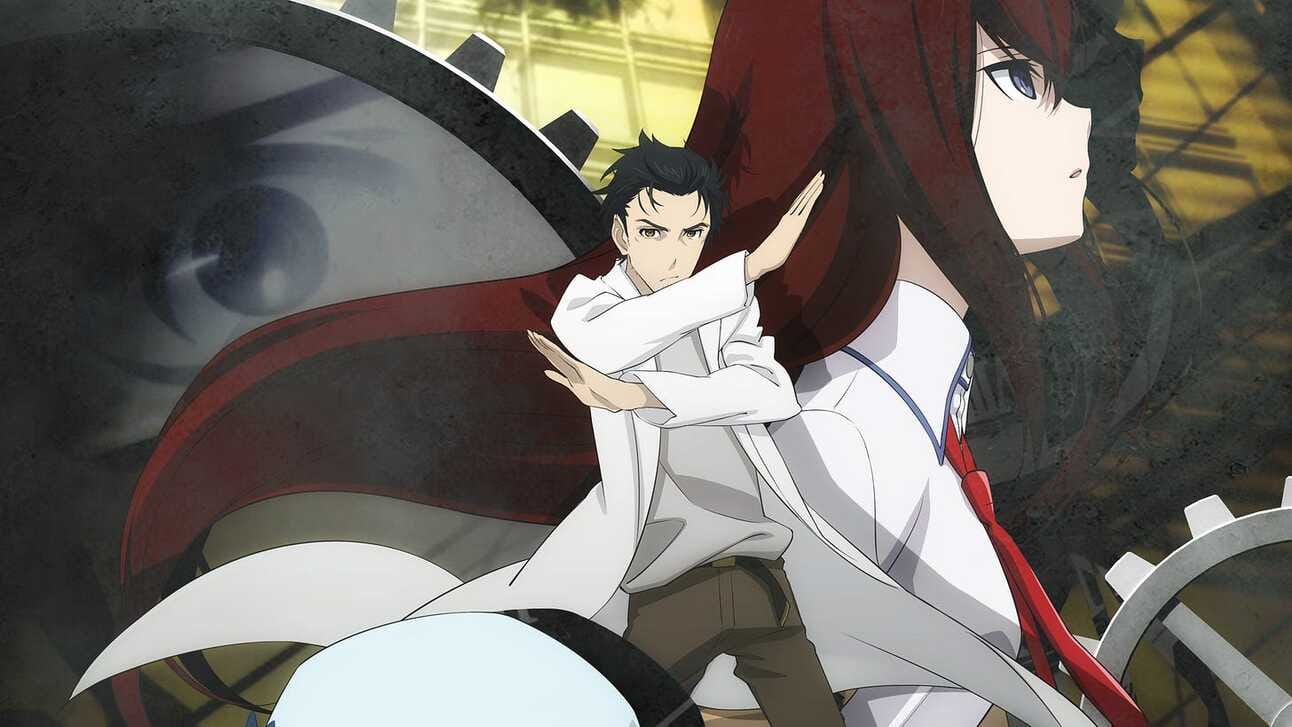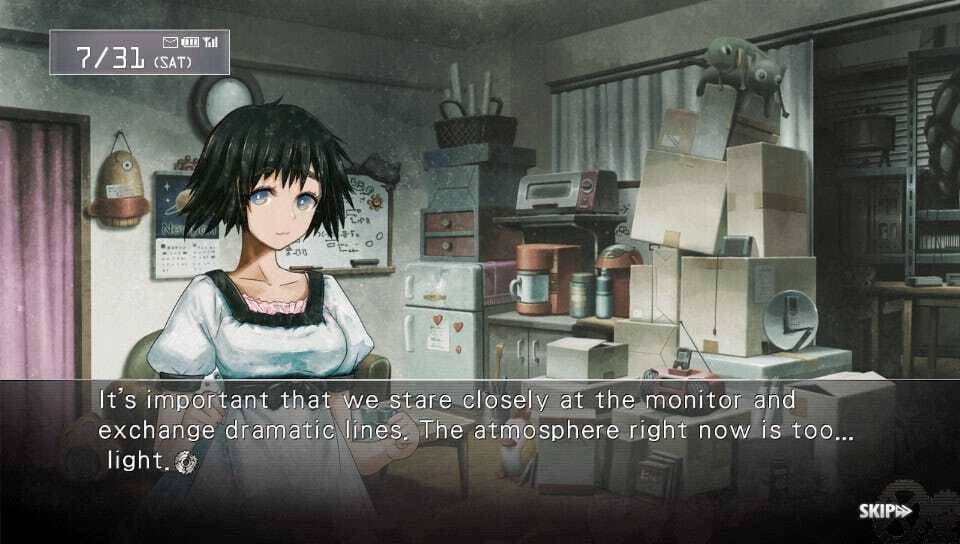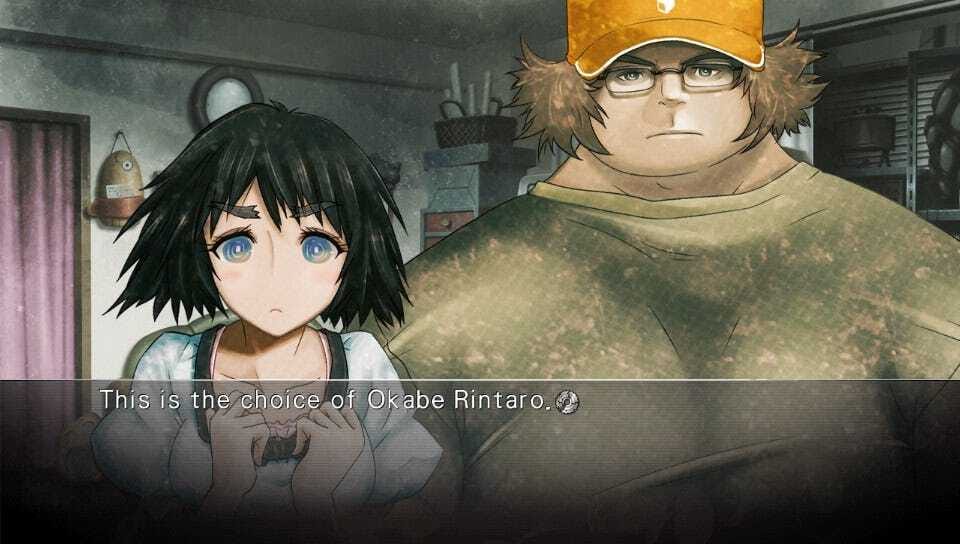- Daguerreo
- Posts
- Daydreaming in a bleak world - Mayuri in Steins;Gate
Daydreaming in a bleak world - Mayuri in Steins;Gate
What's Mayuri role in Steins;Gate
Time-traveling stories are not what I tend to look for. In my brief experience with the genre – and I’m including some isekai animes here –, there’s an enormous chance of the story getting out of control and weird concepts starting to appear just for the sake of justifying why the world, the universe, and life hasn’t ended.
Steins;Gate is, however, my favorite work on this genre and has one of the most interesting takes on the subject. I remember watching, around 2012, the anime for the first time and becoming extremely captivated by how the story explains how our universe works and the rules behind the fourth dimension – Time. Now, twelve years later, I began and got the first ending in the visual novel which allowed me to revisit all the moments I enjoyed in the anime as well as have a better understanding of some characters.

While you might go looking for a good story about time traveling in Steins;Gate, you will find much more. You have a group of teenagers who, as they are led by Rintaro Okabe, a.k.a. Hououin Kyoma the mad scientist, not only unravel the truth of the universe about time traveling, but they get involved with organizations and figures that only populated their imagination.
From changing how a whole area in Tokyo has developed during the 2000s to creating time loops by sending the memories of a person to the past, the experiments Okabe’s group performed in Steins;Gate propose discussions about several topics. The group is constantly confronted with questions such as who should be doing the experiments and whether they are ready to take responsibility for their acts. What mean to have the power to change the world?
Okabe and his friends disregard the role of institutions to organize and deliberate over such questions. They believe, in a very liberal manner, in themselves, in their capacity as individuals. A very super hacka vision. They are young, still teenagers who are excited to find their place in the world and convinced that they will change the world. On the other hand, the lab members are unaware of the weight their decisions carry.
To question the characters – and us, viewers and players – about these topics, the story avoids taking us through long segments of philosophical dialogues and takes a more direct approach. The story shows us. It makes the most awful consequences of the group actions actually happen. It can do that due to the central narrative artifice the story has: time travel. Because the characters can go back and try again, most choices aren’t final and the horrible situation they just saw becomes only a thought experiment, a what-if type of situation that feels really vivid. A reverie to be forgotten.
As the situations unfold, morally questionable attitudes from Okabe or violent acts from other characters are presented to us. While the anime gives you a taste of it, it's in the visual novel where the more violent and gore aspects of the story have room. A fair number of heavy subjects emerge from dialogues in a story where initially you wouldn’t expect it. But it’s in such a starkly gruesome scenario that I could see one of the characters shine more.
Mayuri.

I remember a friend who jestingly uttered that Mayuri came to the world to suffer. I could see that too.
In the anime, it becomes pretty clear– although less visually impactful – the amount of suffering Mayuri goes through in one of the timelines. She is shot. Stabbed. Ran over by the subway. The story doesn’t go easy on her and, at first glance, it seems like she’s destined to play that role. It is, to some extent, her destiny in the story. But it also seemed like she, as a character, was created to work as leverage for Okabe to further develop his understanding of time traveling once motivated by the desire to save her.
Mayuri is, however, much more important, and more precious to our experience with this story than we are led to believe.
Steins;Gate shows us a sad, bleak, cruel side of our world. The future they want to prevent from happening is a dystopian society where power is held by an organization which is only a mask greedy mischievous people hide behind. A world run by the whims of a powerful few. Steins;Gate is almost hopeless about reality, reminding us that it is not always possible to have a win-win situation. The game understands our condition as beings living in the world and through fiction, it questions if we’re ready to compromise morality for power.
For me, it’s through Mayuri that Steins;Gate shows us that its vision of the world is not a canvas filled with a unique hue of pessimism. It believes in finding light – hope – in the world.
Mayuri is, in many situations, portrayed as a girl who lives in a different world apart from the real world. Less knowledgeable about the complex rules of physics, structures of computers, and philosophical texts, Mayuri is pretty much concerned about the world that she sees and feels. She loves making cosplays, eating bananas and making people feel well. She is not interested in discussing conspiracy theories or about what people think of others.
She is a simple person and she’s kind. All it takes to make the room feel lighter after Okarin and Kurisu – a.k.a. Cristina, his assistant – realize the implication of their acts is to hear Mayuri calling them and changing the subject of the conversation completely. It is crystal clear how she is a beacon of light in their lives, dissolving malicious ideas or concerns that make their hearts heavy.

Mayuri seems to alienate herself from the world – and to some extent she does, I believe due to what happened in her past. However, I still believe that she made the decision to see the world with kindness. She understood that someone had too. Otherwise, life would be too damn difficult to cope with.
Mayuri’s silly catchy phrase “Tuturu” and her simplistic approach toward life shine once they are put in front of the bleak reality the story tells about.
Maybe Okabe knows that and his desire to save her is motivated by more than just the love he feels for his childhood friend. Life without Mayuri would starkly engulf them into a pessimistic ocean.
So she wasn’t destined to suffer. She was meant to be that we want to save.
Hope.